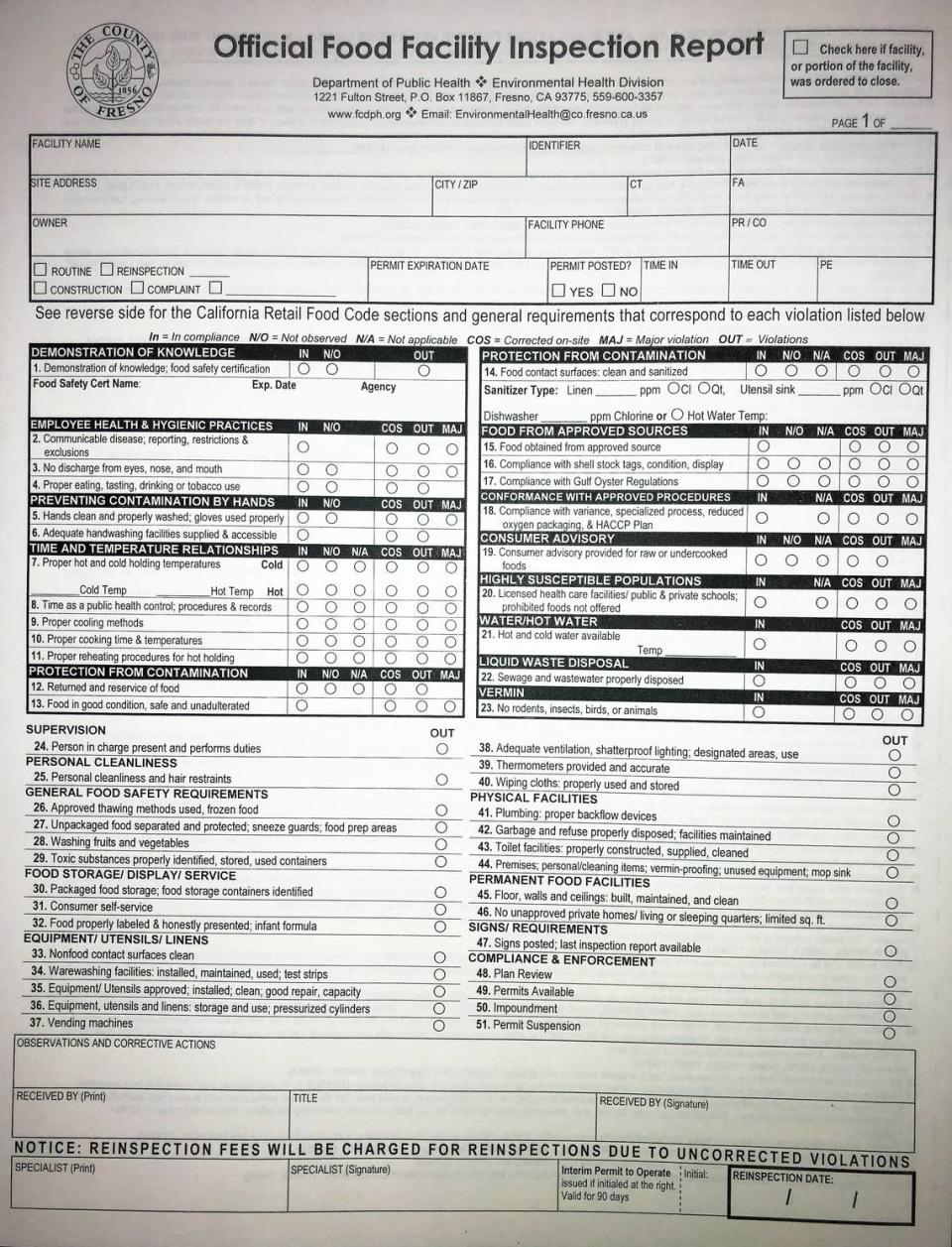Health violations close 6 Fresno food businesses: taco places, food-truck commissary
Reality Check is a Fresno Bee series holding those in power to account and shining a light on their decisions. Have a tip? Email tips@fresnobee.com.
A pair of Fresno taco places were among six food businesses closed temporarily in March following failed health inspections by the Fresno County Department of Public Health.
In addition to Taqueria El Charrito in northeast Fresno and Taco-H in southeast Fresno, a pair of other eateries, a southeast Fresno market and a food-truck commissary also faced closure after violations discovered by inspectors during the month.
At Taqueria El Charrito on North First Street, clogged drains in the kitchen handwashing sinks were discovered during a March 14 inspection, and the restaurant was ordered closed until the problems were resolved. The restaurant reopened five days later, on March 19.
A faulty refrigerator that could not maintain cold temperatures for food was the culprit behind a one-day closure following a March 19 health inspection at Taco-H, on Orange Avenue south of Kings Canyon Road. A re-inspection the following day authorized the restaurant to reopen.
Plumbing issues were responsible for the rest of the closures reported by inspectors in March, all at places in southeast Fresno.
For Papas Locos and Authentic Craving Corp., both operating out of a common food preparation commissary on East Butler Avenue, a lack of hot water at dishwashing sinks were the reasons for inspectors to order temporary closures.
Papas Locos was closed for just one day following a March 18 inspection. Authentic Craving was ordered closed after a March 29 inspection and was reportedly still closed as of Thursday, according to information from health officials.
Inoperable restrooms forced the closure of La Real Michoacana Monarca, which sells fruit cups, ice cream and other snacks from its location on East Butler Avenue. The restaurant was closed for less than a day following its March 21 inspection, reopening after a re-inspection later the same day.
At Sal’s Market on East Kings Canyon Road, the soda fountain inside the store was ordered closed following a March 27 inspection because a broken water pipe outside meant there was no hot or cold water available inside. The health department reported that the partial closure remained in place as of Thursday.
A lack of hot water is one of the most common violations inspectors from the Department of Public Health find when they make their routine visits. Hot water at a temperature of at least 120 degrees is considered important by inspectors for safely washing pots, pans, dishes and glasses, and 100 degrees for employees to wash their hands.
Insect or vermin infestations are another type of violation that can result in immediate closure of restaurants or food businesses when they are observed by health inspectors.
Among other serious concerns for food safety are refrigerators that don’t keep food cold enough or steam tables that don’t keep food hot enough to inhibit bacterial growth, or clogged sinks or drains that cause contaminated water to back up into kitchens.
In most instances, if an inspector finds a problem, it’s something that can be fixed on the spot – issues such as having enough bleach or sanitizer in the water used to wipe down food-preparation areas, putting lids back onto containers in walk-in refrigerators, replenishing soap, paper towels and toilet paper in the restrooms, or reminding employees to wash their hands and wear gloves and hairnets.
When inspectors visit a restaurant or other food service business, there is a lengthy and detailed list of more than 50 things that draw their scrutiny. They include:
Whether the manager and all employees have the required food safety or food-handling certificates.
Hygiene of individual employees.
Ways to keep cold food at or below 41 degrees and hot food above 135 degrees.
Use of proper sterilization for counters, tables, utensils and cookware.
Overall cleanliness.
Proper drainage of sinks and floor drains.
Restrooms stocked with supplies.
Whether the business has the proper license or permit.
The Fresno County Department of Public Health has about two dozen environmental health specialists who monitor more than 5,300 restaurants, snack bars, grocery stores, commissaries, delicatessens and food vendors across the county, making unannounced visits several times a year.
Restaurants also are inspected in response to complaints or other concerns from the public, including when people see what they believe are health or sanitation issues at restaurants.

